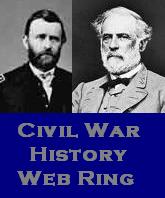I've posted before on the way that the Regular regiments, cavalry and otherwise, received replacements during the war. The bulk of those posts focused on the volunteers which joined by the hundreds following the Antietam campaign from October to December 1862. For the cavalry regiments particularly, these replacements helped bring the Regular regiments close to their authorized strength.
There was, however, a catch. All of these volunteers enlisted in the Regular units for the remainder of their initial enlistment, not a fresh three year term. This was the same time period that the initial enlistments were running out for all of the 6th US Cavalry's personnel. As a result, the Reserve Brigade withered away during the summer months of 1864, losing literally hundreds of men per month. By the end of the summer, these regiments were shadows of their former selves, some literally reduced to the authorized strength of a company or two.
This led to a second wave of reinforcements for the Regulars during the fall/ winter of 1864. This wave, however, was much less effective than the first. This time, nearly all of the replacements were new soldiers, not veterans transferring from other units. Many of them were either draftees or substitutes for draftees. Surprisingly, roughly 20% of these replacements were born in Canada. An estimated 40,000 Canadians fought in the war, but this was the first time that I'd noticed them in any numbers.
The vast majority of them came from recruiting centers in Cincinatti, Harrisburg and Philadelphia, manned by veteran Regular officers who were often recovering from wounds. In Cincinatti, Captain David S. Gordon of the 2nd US Cavalry and 1st Lieutenant Robert Sweatman of the 5th US Cavalry figure prominently in the enlistment records. In Harrisburg it was Lieutenant John McDonald and in Philadelphia Captain Theophilus Rodenbough, both of the 2nd US Cavalry.
Unfortunately, the second wave wasn't nearly as effective as the first wave. Many of them had deserted before the spring campaign even started. The majority of them deserted during the summer of 1865, apparently deciding that their service should end once the war did. From the records that I've seen so far, roughly 25% of those who enlisted during this period completed their enlistments.
Subscribe to:
Post Comments (Atom)


No comments:
Post a Comment